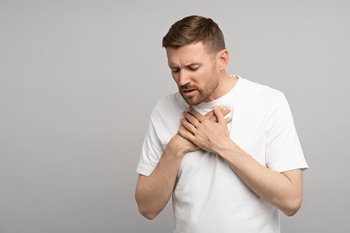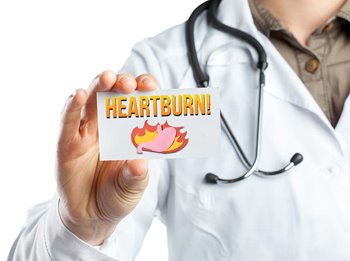 There is a reason most medicine cabinets include a bottle of Tums. According to the American College of Gastroenterology, an estimated "60 million Americans experience heartburn at least once a month and some studies have suggested more than 15 million Americans experience heartburn symptoms each day."
There is a reason most medicine cabinets include a bottle of Tums. According to the American College of Gastroenterology, an estimated "60 million Americans experience heartburn at least once a month and some studies have suggested more than 15 million Americans experience heartburn symptoms each day."
While it may seem like heartburn and acid reflux are minor grievances caused by "too much of the good stuff", they can signal a more serious underlying issue like gastrointestinal reflux disease (GERD).
What is the difference between heartburn, acid reflux and GERD?
Heartburn is a misnomer as it does not involve the heart, but rather the stomach and esophagus, and is actually a symptom of acid reflux and GERD. It is that classic burning sensation in the chest that can rise to the throat; the resulting pain can be so severe that it is sometimes mistaken for a heart attack.
Acid reflux is a condition where stomach acid regularly flows back into the esophagus and causes symptoms such as heartburn. It occurs when the lower esophageal sphincter (LES)—a circular muscle that connects the esophagus and stomach which tightens after food passes into the stomach—becomes weak and allows the stomach acid that digests your food to move backwards into the esophagus.
GERD is a more severe form of acid reflux resulting in a chronic digestive disorder: GERD is a disease. Whereas acid reflux is typically sporadic and affects most people at some point, a GERD diagnosis is when acid reflux causes esophageal inflammation or occurs more than twice a week for a sustained period of time. Prolonged damage to the lining of the esophagus from acid reflux can result in esophageal cancer.
What are the symptoms of GERD?
GERD can cause a wide array of symptoms which vary in occurrence and severity:
- Heartburn
- Regurgitation
- Chronic Cough
- Dysphagia (the feeling of having food stuck in your throat)
- Chest Pain
- Gas & Bloating
- Laryngitis
- Dental Problems
- Asthma
- Interrupted Sleep
- Excessive Salivation
The Richter Scale/Acid Test was developed by The American College of Gastroenterology and can help guide your decision to seek medical assistance:
1) Do you frequently have one or more of the following:
- an uncomfortable feeling behind the breastbone that seems to be moving upward from the stomach?
- a burning sensation in the back of your throat?
- a bitter acid taste in your mouth?
2) Do you often experience these problems after meals?
3) Do you experience heartburn or acid indigestion two or more times per week?
4) Do you find that antacids only provide temporary relief from your symptoms?
5) Are you taking prescription medication to treat heartburn, but still having symptoms?
If you said yes to two or more of the questions above, you may have GERD.
Getting a GERD Diagnosis
 Door County Medical Center's Heartburn & Reflux Center offers several minimally invasive tests which can determine whether or not you are suffering from GERD. These include:
Door County Medical Center's Heartburn & Reflux Center offers several minimally invasive tests which can determine whether or not you are suffering from GERD. These include:
-
The Bravo™ Reflux Testing System: This system involves placing a small capsule on the esophageal wall. The capsule then monitors esophageal pH levels and determines whether acid from the stomach is moving past the LES and into the esophagus.
-
Esophageal Manometry: With this procedure, which lasts between 10-15 minutes, a small tube is passed through your nose, down your esophagus and into your stomach. Sensors on the tube determine the function of the esophageal muscle and the LES by measuring pressure while swallowing small amounts of water.
-
Esophagram: This is a type of x-ray that assists in exploring the anatomy of the esophagus and stomach—can also be used to establish whether a hiatal hernia is present and to help determine its size.
How can I manage my symptoms?
 Often, the root causes of GERD, and the management of symptoms, can be addressed with lifestyle changes, including:
Often, the root causes of GERD, and the management of symptoms, can be addressed with lifestyle changes, including:
- Losing weight
- Changing diet
- Quitting smoking
- Quitting alcohol consumption
Further, over-the-counter and prescription medications may also help manage symptoms of acid reflux and GERD. Common medications include: Antacids like Tums, Rolaids and Mylanta; H2 Blockers like Pepcid and Tagamet and Proton Pump Inhibitors (PPIs) like Omeprazole and Nexium.
What if lifestyle changes and medications don't work?
For more serious cases of GERD, where lifestyle changes and medications have proven ineffective, surgery may be required. For such cases, Door County Medical Center offers several minimally invasive procedures for GERD.
-
Botox injections: These are an excellent alternative for patients with esophageal disorders that don't want to, or can't have, a minimally invasive procedure. Botox injections assist in relaxing the esophageal body or LES by interfering with nerve signals to the esophageal muscle tissue.
-
Fundoplication surgery: This is a type of surgical procedure that attaches the uppermost part of the stomach (the fundus) to the lower esophageal sphincter in order to increase pressure on that muscle, reduce a potential hiatal hernia, and restore the natural, physiological anatomy of the LES.
•
Don't let recurring heartburn go unchecked! If you, or someone you know, is experiencing acid reflux on a regular basis, or the symptoms of reflux have begun to impact quality of life, contact the Heartburn & Reflux Center of Door County at: 920-746-1060. For more information, please visit our Heartburn & Reflux webpage.